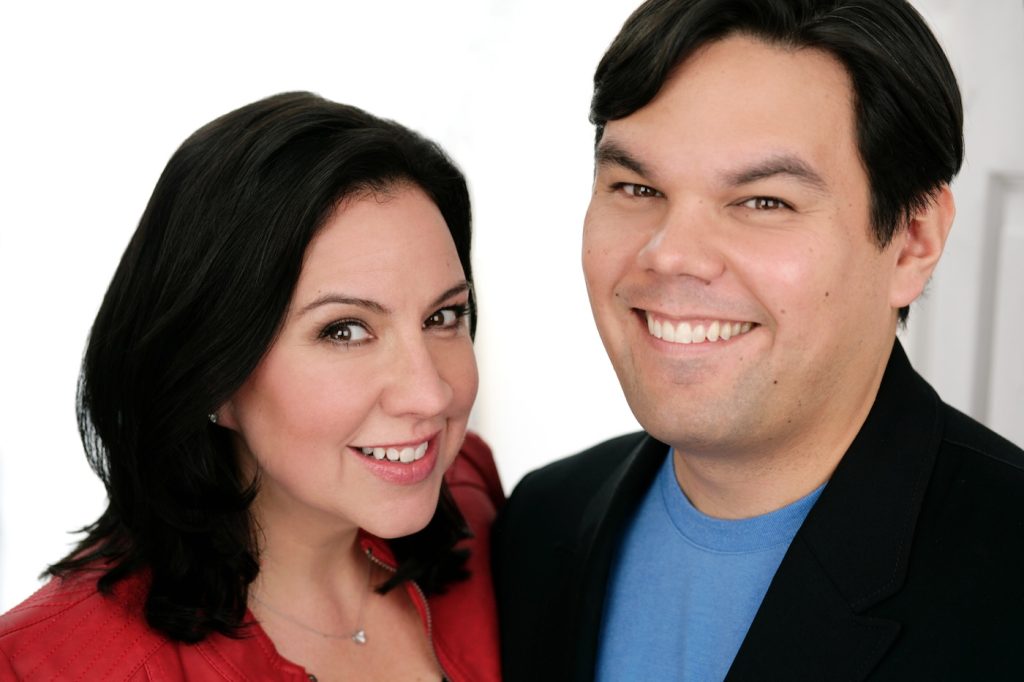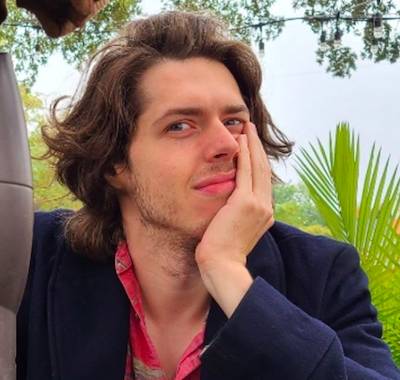“Agatha All Along” Songwriters Kristen Anderson-Lopez and Robert Lopez on Agatha Finding Her Voice
Agatha All Along wisely brings songwriters Kristen Anderson-Lopez and Robert Lopez back to the Marvel Cinematic Universe. This is only fitting, considering the two helped musically introduce Agatha to great acclaim in WandaVision. With the latest Disney+ series from creator Jac Schaeffer, the acclaimed music duo explores music history as they deliver time-spanning variations of the powerful “Ballad of the Witches Road.”
The music is integral not only to the plot but also to the characters in Agatha All Along. Following the titular character (played by the effervescent Kathryn Hahn) after she lost her powers in WandaVision, Agatha is no longer flying solo—she conjures up a coven to help her regain herself via the Witche’s Road. Through the power of song, the bond between the band of witches grows as Agatha reclaims her powers.
Recently, Kristen and Robert Lopez spoke with The Credits about crafting a hypnotic ballad, as well as their enchanting 1970s rock and roll spin on it from episode four.
“Ballad of the Witches Road” is beautiful. What were your first inklings for it?
Kristen: Well, it really came from Jac. Jac had written these incredible scripts. She brought us in after all the episodes had been drafted in some way, and we were able to see what the ballad was doing.
Robert: It even had dummy lyrics in it.
Kristen: Yes, all of the genres she wanted, all of the information. The real trick was, which song were we going to hit first? After thinking, we were like, “We should do the ‘70s ballad first.” It had to sound like a hit, had to be a love song, but it also had to hold all of these pieces of information from different episodes. We knew if we could get that one, then we could start stripping back.

For the ‘70s ballad version, what techniques or little things did you both use to ensure that the song fit this time in American music?
Robert: Jac is a huge Fleetwood Mac fan, as well as the Eagles and Hotel California, and Crosby, Stills, Nash, and Young – those kinds of harmonies. We love that stuff, too. We steeped ourselves in it, especially that 12-string guitar sound that Hotel California has, which has always made the hairs on the back of my neck stand up. It’s a bit of playing with the major and minor scale kind of mixed together to mirror qualities. I thought that was a good place to start musically. Then Kristen took that voice memo I emailed her.
Kristen: When I’m like, “Ooh, that!” – we’ll get it in a voice memo, and then he’ll shoot it to me. I sit in this giant bed with sheets of paper, like three screens up, and no one can interrupt me for six hours. I need to be in flow to feel all these pieces and channel them into a love song. That’s what that day was like.
Have you both considered the soundtrack having B-sides of just the voice memos?
Kristen: That’s a funny idea.
Robert: We are the demo singers of our own songs, so it’s fun to have a playlist of just us and watch it get replaced by the real thing as we go. It’s one of the markers of how we know we’re making progress.
Kristen: We both were in a cappella groups growing up. Do you know how every cappella group has their signature song? My acapella group had “Helplessly Hoping,” which is a Crosby, Stills, Nash, and Young song. And then, for the sacred version, we both sang in churches. Bobby’s first job out of college was singing in an Episcopal choir. Sacred music lives in him.
Robert: Spiritual magic and music are all in the same world for me. That’s central to what we do, finding the magic in music. That’s definitely there in Frozen. We truly believe in this stuff. We make it, but we don’t know quite how or why it works. Sometimes, it’s just a weird alchemy. We were trying to capture the spell that a song can cast.
How’d you both want to get the hypnotic feeling in Agatha All Along similar to what you once sang in choir?
Robert: When I sang in a choir in college, we did a lot of plain chant, Gregorian chant. That’s a very specific singing, so we used that for the sacred chant. We also incorporated the idea of a drone – one character singing while the other sings the melody on top of it. There’s something magical about that, something ritualistic and solemn.
Kristen: It comes all the way from Europe over to America sometime in the 15th century, right around the time Agatha was hanging out in Massachusetts. It’s when the Salem witch hunts were happening, so this would’ve been the music of their time. That’s the origin of a lot of American music. These sacred songs become folk songs that you can sing in taverns and pubs. Then they become blues, and that blues gets turned into jazz in New Orleans, which eventually becomes rock. And that rock leads to all the music we have today.
You get to explore American music history in the show. Were there any new lessons while working on Agatha All Along, something that stuck with you?
Kristen: There’s always something to learn during mastering and mixing because that’s such an odd science. The moment it goes from your mix to the master…
Robert: It’s painstaking.
Kristen: Yeah, because we definitely wanted Patti’s voice to stick out in a way that a pop song would not; you wouldn’t hear Patti LuPone’s voice hitting so high. So, exploring how we keep the individual voices in a process that’s so much about smoothing everything out was fun.
Robert: Actually, the thing I didn’t know was Fleetwood Mac’s “Silver Spring.” I didn’t know that song. It’s one of Jac’s favorites, and she said, “You’ve got to watch the live recording.” It was 20 years later, and they finally sang it together on stage. You can see she turns to him, and he’s looking away because it’s all about his infidelity. There’s a moment where he meets her gaze, and the whole song takes on a level of drama. We were both crying watching it. Such an incredible song. It deepened my appreciation for that era and that group.
Which is basically one of the greatest soap opera stories in music, right?
Kristen: Well, it’s obviously in the zeitgeist. We had already written this song, and then we heard about this little show – it’s not little anymore – called Stereophonic, which also explores the drama behind iconic songs. But Jac had written the whole episode long before Stereophonic came to Broadway. We’re all fascinated by these songs that live rent-free in our brains.
Robert: Everybody loves the behind-the-scenes of music. In many ways, Agatha is about that. It’s about the formation of this coven, which is kind of like a band – the infighting and the search for connection. WandaVision was about being trapped in a bubble, and Agatha All Along was about breaking out and finding your people.

How else did you want the music to tell that story?
Kristen: Everyone in this coven has something to heal. These songs are part of that healing. There’s healing in the sacred version that brings these isolated witches together. When we sing in harmony, oxytocin is produced. It’s the bonding hormone that’s also produced when breastfeeding. Singing together creates bonding and love. You don’t even have to sing – you just have to be in the same space as people singing. It truly creates a physical connection.
Agatha All Along is streaming on Disney+
Featured image: (L-R) Rio Vidal (Aubrey Plaza), Agatha Harkness (Kathryn Hahn) and Lilia Calderu (Patti LuPone) in Marvel Television’s AGATHA ALL ALONG, exclusively on Disney+. Photo by Chuck Zlotnick. © 2024 MARVEL.



